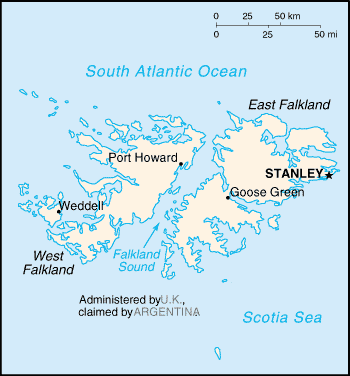This is an old revision of this page, as edited by Beanom (talk | contribs) at 19:52, 2 March 2021 (←Replaced content with '<table border=1 cellpadding=2 cellspacing=0 align=right style="margin-left:0.5em;" width="300px"> <caption><font size="+1">'''Falkland Islands (Malvinas)'''<...'). The present address (URL) is a permanent link to this revision, which may differ significantly from the current revision.
Revision as of 19:52, 2 March 2021 by Beanom (talk | contribs) (←Replaced content with '<table border=1 cellpadding=2 cellspacing=0 align=right style="margin-left:0.5em;" width="300px"> <caption><font size="+1">'''Falkland Islands (Malvinas)'''<...')(diff) ← Previous revision | Latest revision (diff) | Newer revision → (diff)
| |||||
| Motto: Desire the right | |||||
| Official language | English | ||||
| Capital | Port Stanley (Puerto Argentino) | ||||
| Governor | Howard Pearce | ||||
| Chief Executive | Chris Simpkins | ||||
| Area - Total - % water | not ranked 12,173 km² - | ||||
| Population
- Density | not ranked
| ||||
| Currency | Falkland pound (FKP; fixed to GBP) | ||||
| Time zone | UTC -4 (DST -3) | ||||
| National anthem | God Save the Queen | ||||
| Internet TLD | .FK | ||||
| Calling Code | 500 | ||||
The Falkland Islands (also known as Islas Malvinas in Spanish) are an overseas territory of the United Kingdom. They are also claimed by Argentina.
The capital is Port Stanley.

History
Main article: History of the Falkland Islands
The Falkland Islands were first seen in 1520 by Magallanes. They remained practically unsettled until the 19th century. Argentina set up a penal colony in the islands in 1820, and in 1929 named Luis Vernet as the islands' governor, in order to colonize them. The United Kingdom took the islands in 1833, but Argentina maintained its claim. Various tensions led to an invasion in 1982; which was later reversed. See: Falklands War.
Politics
Main article: Politics of the Falkland Islands
Executive authority comes from the Queen and is exercised by the governor on her behalf. There is a constitution, which into force in 1985. Under the constitution, eight Legislative Councillors, five from Stanley and three from Camp, are elected every four years.
The Executive Council, which advices the governor, consists of the Chief Executive, Financial Secretary and three Legislative Councillors which are elected by the other Legislative Councillors.
The The Legislative Council consists of Chief Executive, Financial Secretary and the eight Legislative Councillors. The governor is the speaker.
Defence is the responsiblity of the UK
Geography
Main article: Geography of the Falkland Islands
The islands are 300 miles (483 km) from the South American mainland.There are two main islands, East and West Falkland and 200 small islands. The total land area is 12,173 sq km.
Economy
Main article: Economy of the Falkland Islands
The largest industries are fishing and agriculture. The islands have oil reserves that are believed to be quite substantial, but yet to be exploited
Demographics
Main article: Demographics of the Falkland Islands
The population is 2,967 (July 2003 estimated).
Culture
Main article: Culture of the Falkland Islands
Miscellaneous topics
- Communications in the Falkland Islands
- Transportation in the Falkland Islands
- Military of the Falkland Islands
- Stamps and postal history of the Falkland Islands
See also
- Battle of the Falkland Islands - naval engagement of the First World War
- Falklands War - conflict between Argentina and United Kingdom
- Major Samuel Stransham